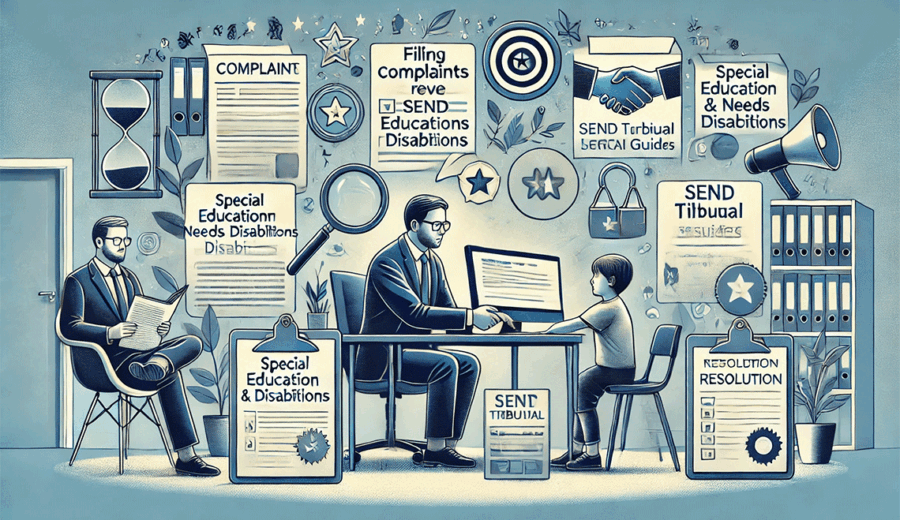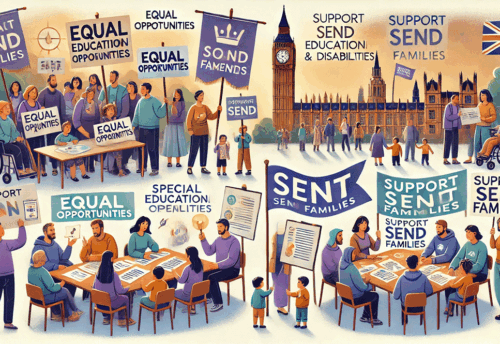
November 27, 2024
Complaints and Resolving SEND Disputes
Filing Complaints and Resolving SEND Disputes: A Parent’s Guide
Parents of children with Special Educational Needs and Disabilities (SEND) often face challenges when services, support, or accommodations fall short. Understanding how to file complaints and resolve disputes is essential for ensuring that a child’s rights are upheld. Here’s an in-depth guide for navigating the process:
1. Recognizing the Need for Action
1.1 Common Issues Leading to Complaints
- Delays in assessing or issuing an Education, Health, and Care Plan (EHCP).
- Failure to deliver the support specified in an EHCP.
- Discrimination or exclusion in schools.
- Disputes over school placement or transport arrangements.
1.2 Early Signs of Problems
- Missed deadlines for EHCP processes.
- Lack of communication or transparency from schools or local authorities.
- Evidence of unmet needs impacting the child’s education or well-being.
2. Steps to File a Complaint
2.1 Raise the Issue Informally
- Start with a direct conversation with the school’s Special Educational Needs Coordinator (SENCO) or headteacher.
- For health or social care issues, contact the relevant service provider.
2.2 Submit a Formal Complaint
- To the School or Local Authority:
- Follow their complaints procedure, usually available on their website.
- Provide a detailed account of the issue, supported by evidence (e.g., emails, reports).
- For Health or Social Care:
- Address complaints to the NHS or local council’s social care department.
3. Escalating the Complaint
3.1 Mediation
- When to Use Mediation:
- Required before appealing EHCP decisions to a tribunal (except for discrimination claims).
- How It Works:
- An independent mediator facilitates discussions between parents and the local authority to resolve the issue.
3.2 Appeal to the SEND Tribunal
- What It Covers:
- EHCP-related disputes (e.g., assessments, content, or placement).
- Disability discrimination claims.
- How to Appeal:
- File within two months of the decision or one month after mediation ends.
- Submit evidence and attend the hearing to present your case.
4. Preparing a Strong Complaint or Appeal
4.1 Gather Evidence
- Collect reports from therapists, doctors, or educational psychologists.
- Include communication records (emails, letters) and meeting notes.
4.2 State Your Case Clearly
- Use a structured format:
- What happened?
- How did it affect your child?
- What do you want to be done?
4.3 Seek Support
- Advocacy organizations like IPSEA or SENDIASS provide free advice.
- Engage legal aid if eligible for complex cases.
5. Alternative Resolution Options
5.1 Ombudsman Complaints
- Local Government and Social Care Ombudsman (LGSCO):
- Handles unresolved complaints about local authorities.
- Parliamentary and Health Service Ombudsman:
- For NHS-related disputes.
5.2 Independent Review Panels
- Available for complaints about school exclusions or transport.
5.3 Judicial Review
- A legal challenge for breaches of public duty, such as unreasonable delays in EHCP processes.
6. Tips for Effective Advocacy
6.1 Stay Organized
- Keep a detailed record of all interactions, deadlines, and responses.
6.2 Be Persistent
- Follow up regularly and escalate when necessary.
6.3 Maintain a Professional Tone
- Use factual, non-emotional language to make your case.
7. Resources for Parents
7.1 Advocacy Organizations
- IPSEA: Offers free legal advice and representation for SEND cases.
- Contact: Provides information and support for SEND families.
7.2 Legal Support
- Pro bono services from law centers or legal aid for eligible families.
7.3 Government Resources
- GOV.UK: Guidance on EHCPs, SEND tribunals, and local complaints.
8. Common Challenges and How to Overcome Them
8.1 Delays in Responses
- Set reminders and follow up consistently.
- Escalate unresolved delays to higher authorities or ombudsmen.
8.2 Incomplete Evidence
- Request updated assessments or letters from relevant professionals.
8.3 Emotional Stress
- Seek support from family, friends, or counseling services.
- Join parent support groups for shared experiences and advice.
9. Knowing Your Rights
9.1 Under UK Law
- The Equality Act 2010 protects against discrimination in schools and public services.
- The Children and Families Act 2014 ensures access to SEND support.
9.2 Right to Advocate
- Parents have the right to challenge any decision that affects their child’s education or well-being.
10. Final Steps: Ensuring Resolution
- Once resolved, request written confirmation of agreed actions.
- Monitor implementation to ensure commitments are met.
Filing complaints and resolving disputes may feel overwhelming, but persistence, preparation, and support can lead to meaningful outcomes. This process empowers parents to secure the best possible future for their children.





Leave a Reply